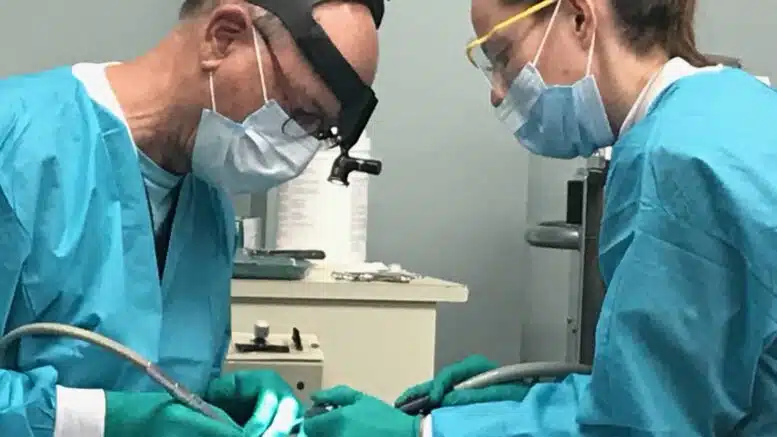By Anne Blythe
If a group of dentists, policymakers and health care analysts got their way, North Carolina would do some revamping of its oral health care infrastructure to make routine cleanings and preventative care more accessible to hundreds of thousands of people.
If routine dental care were more accessible to large segments of the state — those on the lower rungs of the socioeconomic ladder or perhaps in rural regions that have provider shortages — it could have a positive impact on the overall health of the state, the group said.
For nearly 17 months, a North Carolina Institute of Medicine Oral Health Transformation Task Force has studied how to make that happen. The group invited speakers, held meetings and conducted interviews with an array of experts. Their hope was to strengthen the delivery of oral health care so it is comprehensively and “seamlessly integrated with overall health,” according to a 118-page report issued last month by the task force.
The task force’s dream
“In this future, dentistry is a valued contributor to improved health and exists within a landscape where high-quality oral health care transcends siloed care and complicated administrative processes,” the report states. “This vision aims to change oral health by placing patients at the center and emphasizing accessibility, equity, and integration within the broader health care landscape.”
The task force’s vision complements efforts by dentists, dental hygienists and oral surgeons over the past decade to dispel the notion that oral health is not intrinsically linked to overall health.
A bit of history
The separation of medicine and dentistry, by some accounts, dates back centuries.
Some place responsibility for the division on Pierre Fauchard, an 18th-century French physician often called “the father of modern dentistry.” Others link the divergence to the early 20th century when some began to see dentistry as more of a craft than lifesaving care, according to a 2014 WBUR interview with James Gutmann, editor of the Journal of the History of Dentistry.
Studies have shown that tooth loss and periodontal disease are associated with heart ailments and cardiovascular disease. Not having a healthy smile can be detrimental to employment prospects and take a toll on a person’s mental health, research indicates.
“Dentistry must be viewed and practiced as an important part of providing good overall healthcare,” Steve Cline, vice president of the North Carolina Oral Health Collaborative and a task force member, said in the report. “Dentistry, like mental health, has traditionally been viewed as a separate issue.
“The importance of mental health has recently been talked about more openly and as a result significant system changes and funding have been directed that way. It is time for dental health to get that attention and support as well.”
More for Medicaid?
Some of the areas the task force focused on were insurance models that posed barriers to care and how to get more dentists to treat patients on Medicaid.
Dentists have been lobbying for a Medicaid reimbursement rate increase. The current rate — about 34 cents on the dollar — is the same that it was in 2008. As a result, many dentists don’t accept Medicaid patients.
Currently, only about 45 percent of the state’s dentists accept Medicaid patients, and many that do are not accepting new Medicaid beneficiaries.
When North Carolina expanded its Medicaid rolls in December to make as many as 600,000 more people eligible for the state- and federally supported health care coverage, those new recipients would also become eligible for oral health care benefits. The state’s Medicaid program offers a comprehensive oral health benefits package that includes routine cleanings, screenings and other preventative services, but finding a welcoming provider has been difficult for many.
Since Dec. 1, 451,194 people have been added to the Medicaid rolls, according to the Medicaid Expansion Dashboard.
The presence of all those new beneficiaries has put pressure on dentists and other oral health care providers to take on more Medicaid patients. But many have balked at the proposal, saying 34 cents on the dollar is not enough for them to make their business models work.
Even with the dearth of dentists accepting Medicaid, more than $17.9 million in claims for dental services have been filed since Dec. 1, according to a news release issued Thursday by the governor’s office.
Gov. Roy Cooper proposed a spending plan to lawmakers last month that would increase that reimbursement rate for dentists in the fiscal year that begins July 1.
Jay Ludlam, deputy secretary for NC Medicaid and leader of the $21 billion North Carolina Medicaid program, told NC Health News this week that Cooper’s spending proposal would add $45 million in state funds to increase the Medicaid reimbursement rate for people on the rolls before the expansion. Federal funds coming to the state as an incentive to expand Medicaid would make even more money available.
But the spending decision ultimately will be in the hands of the General Assembly, the body that holds the state’s purse strings.
Mental health model?
Ludlam acknowledged that with the rates as they are, many of the dentists who accept Medicaid beneficiaries at some level are providing charity care. “This is why we feel like we need to raise the rates,” he told NC Health News.
As important, said Ludlam, a member of the task force steering committee, is trying to get a broader conversation going about how important oral health is to overall health. He likens it to the discussions that arose during the pandemic about the critical nature of mental health care.
Those discussions led to what state officials have described as a “once in a lifetime” investment in mental health services, with millions of dollars of state and federal funds going to a vast array of programs.
“What we’re trying to do is do the same for dentists,” Ludlam said.
There are many recommendations on the pages of the task force report, such as working with educational programs, medical organizations and community groups, and even creating a General Assembly task force to tackle some of the problems.
“Oral health plays a critical role in individual and community health outcomes and is intricately connected to physical, mental, and social well-being,” the report states. “Our state can ensure that patient needs drive investments and care decisions and that all residents receive timely, tailored, and personalized oral health care that complements whole-person health.”














